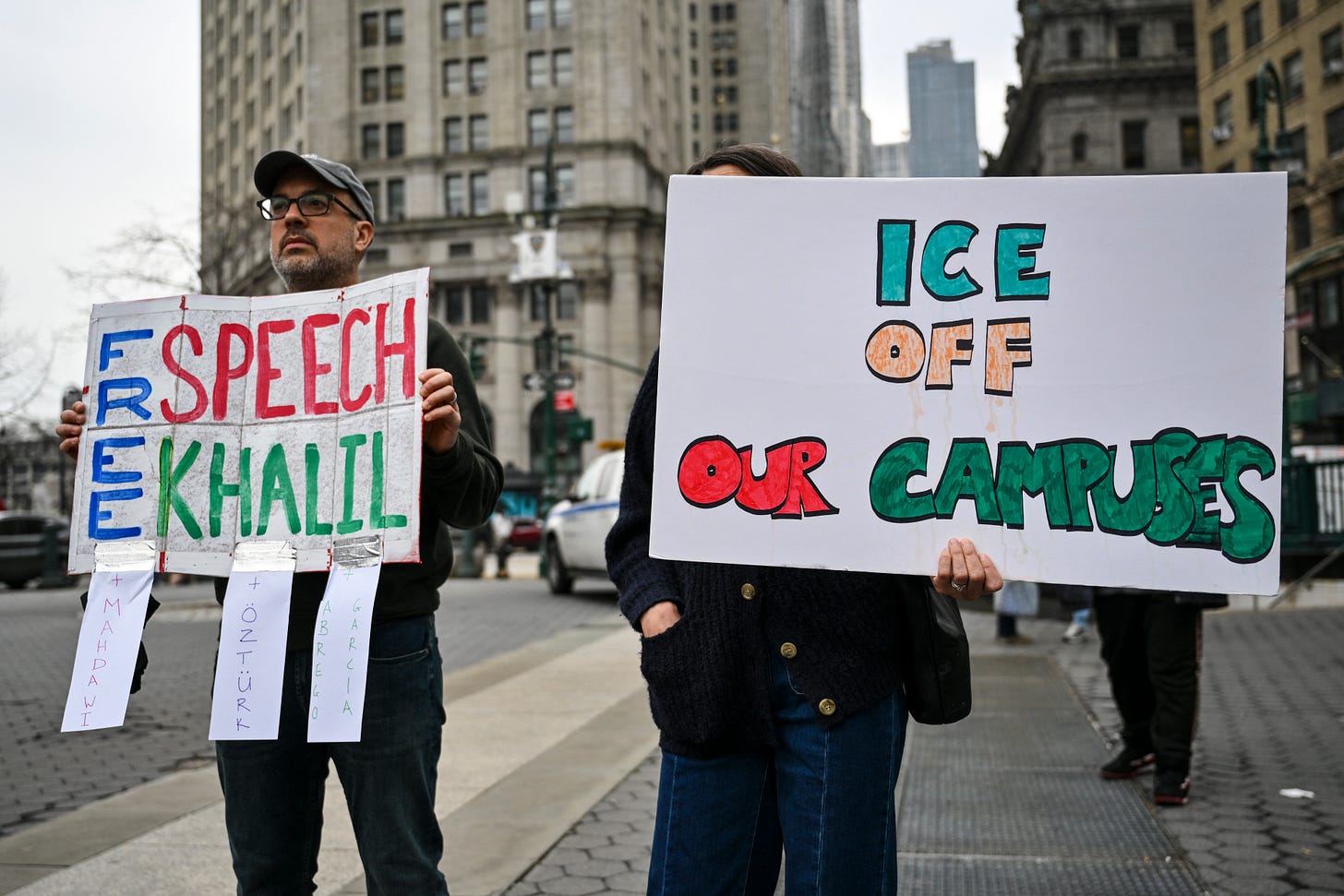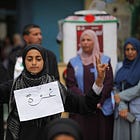SCOOP: Trump Admin Forcing Schools to Report International Students for Protest Activity or 'Antisemitic Actions'
The new requirements are "nudging school officials to be the ‘bad guys’ and give more excuses to terminate student visa records," one school official said.

The State Department is directing university officers to report international students and scholars for participating in certain campus protests, “proscribed antisemitic actions,” “terrorist activity,” or “endorsing or espousing terrorism,” according to emails seen by Zeteo.
The new policies will impact the J-Visa program, which includes people participating in academic or work-related exchange programs in the US.
There had already been an array of things that university officers were directed to report, including fraud and incidents of abuse or those involving child protective services. But the State Department is adding three new reportable incidents that direct schools to determine what qualifies as antisemitic or terrorist “endorsing” behavior that merits reporting.
One university officer told Zeteo they think the government is “nudging school officials to be the ‘bad guys’ and give more reasons/excuses to terminate student visa records.” They added that these requirements may give the government “another excuse to take away a school's ability to sponsor visas.”
In the emails seen by Zeteo, the State Department includes several examples of the three new reportable incidents (directly quoted):
Proscribed Antisemitic Actions (e.g., physical actions directed towards Jewish individuals and/or their property, community institutions or religious facilities that violates the law or university rules)
Serious Violations of University Conduct Rules (e.g., participation in a building occupation, participation in an unauthorized encampment, disrupting classes, intimidation, harassment, assault)
Terrorist Activity, Endorsing or Espousing Terrorism: (e.g., engaging in terrorist activity; membership in a terrorist organization; endorsing or espousing terrorist activity)
The government tells officers they must report such incidents within one business day.
The State Department and the Office of Private Sector Exchange Program Administration’s Academic and Government section – where this directive came from – did not immediately respond to a request for comment.
Per the State Department’s “incident reporting rubric,” the examples given are not meant to be exhaustive. The department notes that there could be other situations that could risk its or the exchange program’s reputation. The disclaimer is notable given how the US has justified its arrest and efforts to deport people, including Mahmoud Khalil, Mohsen Mahdawi, Rumeysa Ozturk, and Badar Khan Suri, on the idea that they are threatening US foreign policy.
The administration has apparently relied on universities in the past to justify visa revocations and detainings. The State Department justified detaining Mahdawi, a Palestinian Columbia student, by arguing he threatened the “Middle East peace process” due to his "threatening rhetoric and intimidation."
That characterization – “threatening rhetoric and intimidation” – came straight from an unretracted lie by Columbia University about a campus protest, where Mahdawi actively condemned antisemitism. Nonetheless, the State Department used the exact language as justification to target Mahdawi. And that same language of “intimidation” is used as an example in the State Department’s new criteria for reporting students.
A second university officer told Zeteo that the new requirements place a lot of burden on them to make such determinations. "And honestly, I don't know what the enforcement mechanisms are... especially when what ‘antisemitism’ is... subjective, to say the least. And when protests, etc, are still First Amendment protected activities,” the university officer said.
“I cannot imagine any school official worth their salt to fall over themselves to comply with this here, but I have no idea what the consequences might be."
“Political and Security Theater”
For years there has been a reporting rubric that universities were directed to follow, but one senior higher education professional told Zeteo that it has largely been seen by administrators and the government as a way to work together to get ahead of any incidents that may shed a negative light on exchange programs.
But, the professional found the inclusion of the new factors alarming, especially given the atmosphere schools now find themselves in – like the Department of Homeland Security demanding “detailed records” on student visa holders. They said that the pre-existing rubric could already address conduct mentioned in the three categories, and the inclusion of the new factors seems part of “political and security theater.”
Concerning the requirement to report antisemitic incidents, the professional said, “It’s likely that any violent physical action against any other students or any campus facilities of any kind would already warrant an institutional response,” and reporting to the State Department. “Mentioning Jewish individuals specifically seems to continue a political narrative about this.”
“Our community may be concerned that DOS [Department of State] could use these new items to penalize sponsors or schools, especially if DOS and the school differ on whether certain conduct or speech meet the new descriptions,” they continued. “This new rubric may cause some to worry that they are now expected to investigate the personal lives of exchange visitors.”
They concluded that the exchange visitor program has long been among the nation’s most effective tools of diplomacy and even “soft power” – with many alumni going on to leadership roles in their home governments and remaining “friends and promoters of the US.” They said that they're not aware of one “terrorist” in the over two decades they’ve spent following the program and even serving as an overseeing officer, “so this new rubric seems like politics, security theater, and another attempt to instill fear in exchange visitors and international students and their host institutions.”
The Trump administration had previously revoked thousands of visa statuses for students across the country, without their knowledge, on the grounds of everything from minor traffic violations to even being victims of sexual abuse. After massive backlash and continually losing in court, the administration reversed some of those terminations – but pledged a new operation to review and terminate the records of international students. ICE subsequently moved to actually expand its ability to revoke visa statuses.
The developments also follow the Trump administration’s continual losses in court on high-profile cases: Mahdawi, Ozturk, and Dr. Khan Suri have all been released from ICE detention in recent weeks.
Days into his second term, Trump issued an executive order announcing his crackdown on antisemitism, which has culminated in the aforementioned sweeping revocations and arrests of foreign students and scholars, as well as the new, untested requirements for schools to now report students for purported antisemitism or protest activity.
However, just this week, the Trump administration warmly welcomed a white Afrikaner, Charl Kleinhaus, who once said, “Jews are untrustworthy and a dangerous group.” But, Kleinhaus insists his remarks were taken out of context, assuring that he supports Israel.
If you are a student affected by this or someone who works in or around the US government with relevant information about Trump’s crackdown on pro-Palestine speech, please contact me via email or Signal (premthakker.35).
Check out more from Zeteo:






This is INSANE! Where are all of the 1A defenders?!
But Trump said the Charlottesville "Jews Will Not Replace Us" chanters were good people. Make it make sense.